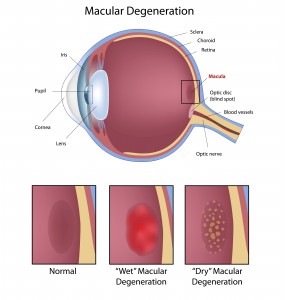 WHAT IS MACULAR DEGENERATION?
WHAT IS MACULAR DEGENERATION?
The macula is the area of the retina responsible for central, fine vision. AMD causes this area of the retina to deteriorate and not function properly, resulting in poor central vision. In turn, poor central vision can cause difficulty reading, watching TV, recognizing faces, driving, etc. Peripheral vision is not affected by macular degeneration. It is very common, affecting about one in seven people over the age of 50 to some degree.
WHAT ARE THE RISK FACTORS FOR AMD?
There is no known cause for AMD, but several risk factors exist, including smoking, age, family history, female gender, Caucasian, UV exposure, poor diet, obesity, high blood pressure, and light-colored eyes.
WHAT ARE THE TWO TYPES OF AMD AND THE RESPECTIVE TREATMENTS?
The “dry” type of AMD involves slow deterioration of the macula over years to decades. There is no active treatment for this type, although certain combinations of vitamins have been shown to significantly decrease the risk of progression to the “wet” type of AMD.
Wet AMD occurs when new but abnormal blood vessels grow beneath the retina and leak blood or fluid. This can cause sudden distortion or a sudden decrease in vision. Treatment currently involves injection of medication into the eye to eliminate the abnormal blood vessels.
WHAT ARE THE SYMPTOMS OF MACULAR DEGENERATION?
The symptoms of AMD include difficulty reading or with activities that require fine vision, distortion (straight lines appear bent), difficulty distinguishing faces, or dark patches obscuring central vision. Many people also notice a need for increased illumination, sensitivity to glare, decreased night vision, and poor colour sensitivity.
WHAT CAN BE DONE TO PREVENT PROGRESSION OF MACULAR DEGENERATION?
Regular screening with an Amsler Grid is the best way to pick up progression of macular degeneration to the wet form. However, the best way to prevent progression is through the use of specially prepared vitamins (ie. Vitalux).
WHEN SHOULD YOU CONTACT YOUR OPHTHALMOLOGIST?
You should check your eyes separately with an Amsler Grid 2-3 times per week. If any changes are noticed, including new distortion of the lines or lines missing, you should contact Dr. Walker’s office.
